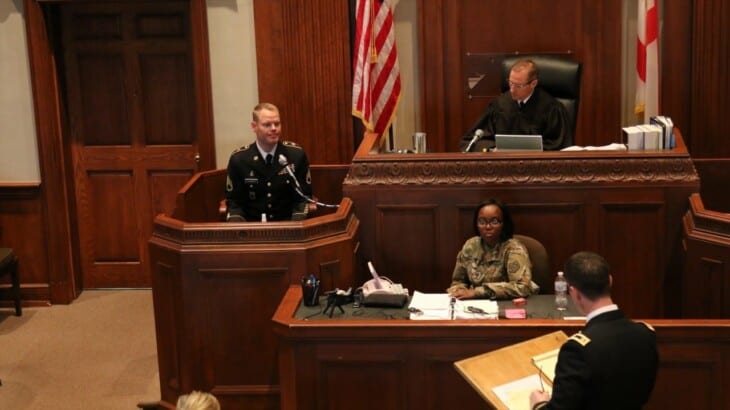It would seem clear that civilian and military courts are separate and operate under their own rules and laws, but are there instances where civilians can be court-martialed? As it turns out, there could be situations where civilians could face military justice.
Civilians can be court-martialed where they are contracted to or employed by the military and breach conduct or contractual laws where a state of martial law has been declared. Those terms are breached, or where civilians have been accused of crimes under the laws of war.
Can Civilians Be Court Martialed If They Are Employed By The Military?
The Uniform Code of Military Justice governs the military. The laws apply to all personnel serving or contracted to the US Military in all regions outside the continental US except Hawaii, The Virgin Islands, Puerto Rico, and the Panama Canal Zone.
Any person working for the military, whether as a consultant, contractor, or advisor or if a defense company employs them, is subject to military law under their terms of contract or employment. This extends to civilians accompanying US military personnel in the field as observers or advisors.
For any civilian to be court-martialed, they have to have a direct connection to the US military in some form or another; otherwise, they would fall under the auspices of the civil justice system.
It is interesting to know that military personnel could also be tried under civil and military law for crimes like murder, theft, and fraud. At the same time, it would be unlikely that both civil and military justice systems would try civilians accused of crimes even where the military was the ‘victim.’
Can Civilians Be Court Martialed Where A State Of Martial Law Has Been Declared?
In situations where martial law has been declared, such as in a natural disaster where all civilian judicial structures, such as the police and the courts, are non-functional, the implementation of martial law would supersede the civilian justice system.
When this happens, all pre-martial law structures, such as the courts and civilian police, are either shut down or incorporated under martial law to assist with the military’s enforcement of the imposed laws.
Often, curfews are imposed to control the movement of civilians, and checkpoints or roadblocks may be set up to aid with traffic flow. Rations and other food and water restrictions could be implemented depending on the circumstances, and breaches of these temporary rules would be punishable under military law.
When citizens are arrested for breaking military curfew or rules under martial law, they are arrested by military police, not civilian authorities, and tried by a military tribunal as any member of the armed forces.
In a combat or war environment, martial law may be far more rigid and strict on civilians, enemy combatants, and serving personnel. In this situation, martial law enforcement is mainly to ensure that order is maintained while military operations are being conducted and that civilians that contravene martial law are held accountable.
Any civilians found to be in contravention of the rules imposed under martial law would be court-martialed as the existing civilian enforcement structures would no longer be in place, and they would undergo the same process as any other military personnel.
The severity of the sentence would be relative to the crime. Still, unlike civilian courts, there would be little leeway for defense arguments as the law usually favors the occupying military force.
It should also be noted that unless the military employs a civilian without the declaration of martial law, no civilian could be court-martialed under US law. Even if the crime involved the military, such as fraud or theft, this would proceed as a civil matter, not a military one.
Only where military personnel was involved, for example, could they be tried under court martial while the civilians would be subject to the existing civil justice system’s processes.
Can Civilians Be Court Martialed For War Crimes?
One of the most famous trials of all time took place in Nuremberg, Germany, just six months after the Second World War had ended. This was a military tribunal convened by the Allies to establish the role of individuals in war crimes committed during WW2.
Not all defendants were military personnel, as some were diplomats and politicians. Still, because this was a war crimes court, civilians were court-martialed as they were guilty of committing crimes against humanity and contravening the laws of war.
While that may seem counter-intuitive, there are established and agreed-upon rules of engagement that provide for the humane treatment of prisoners of war and civilians that come under occupation. While this is mainly aimed at controlling war atrocities by soldiers, there have been instances like Nuremberg where civilians were court-martialed for breach of these laws.
It should also be noted here that civilians accused of war crimes would not be tried in civilian courts as the civil justice system does not have the statutes in place to deal with crimes committed in war; this is why the Nuremberg trials and other court-martials have been utilized to deal with war crimes.
In 1943, the leaders of the Allied forces signed an agreement called the Moscow Declaration Of German Atrocities.
This document allowed for those Germans, both military and civilian, deemed responsible for executions, massacres, or atrocities to be sent back to the countries they had committed those crimes to be tried and punished under the laws of that country and not specifically by court-martial.
But, where atrocities that affected more than one country had been committed, those accused of such crimes would be tried under an International Military Tribunal, which became known as the Nuremberg Trials.
Applying military law to civilians is limited to specific situations and is not commonplace unless the above conditions have been met. In most cases, the US is critical of trying civilians by court-martial unless there is direct evidence of war crimes or where martial law has been declared, and even that is only when the civil courts cannot function.
The most likely cases where civilians can and would be court-martialed is where they are employed or contracted to the military. Then their actions or misdeeds would be subject to the application of military law.
How To Determine If You Could Be Court Martialed As A Civilian
If you are going to be working for or contracted to the military in any shape or form, make sure you understand the legalities and terms of your contract and what law your work and yourself would be accountable to before you sign any agreement.
Remember that while you could have representation as you would for a civilian matter, the processes and procedures as well as any defense you may offer or need to offer, may not follow the same rules as that of civilian laws.
If your contract stipulates that your actions and conduct fall under the Uniform Code Of Military Justice, make sure you know which sections of this code you fall under and if need be, get some advice to clarify them.
Under this code, any breaches could well see you court-martialed as a civilian and subject to sanction and punishment under military law and possibly civil law as well, depending on the severity of your crime.
References ▾
Related Posts













